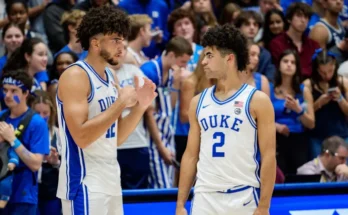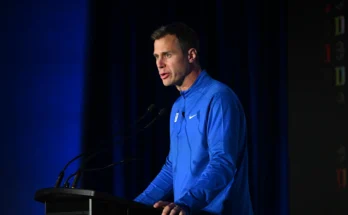The Tennessee Volunteers, a program rich with tradition and history, have faced their fair share of ups and downs over the years. From national championships to seasons of frustration, the Vols have experienced the full spectrum of success and failure in college football. However, the current era under head coach Josh Heupel has been a time of hope and optimism for many Tennessee fans. That is, until recently, when the Vols were hit with a wave of disrespect that some argue is the worst the program has seen since Heupel first took the helm on Rocky Top.
The offseason has been a tumultuous time for Tennessee, as the Vols have been subjected to an overwhelming amount of disrespect from both within and outside the college football world. Whether it’s from rival fans, national pundits, or even the perception of the program’s national standing, Tennessee is once again fighting to prove its worth. But this disrespect is not a new phenomenon; it’s a reminder of how far the program has come since Heupel’s first season and how far they still have to go.
When Josh Heupel took over the Tennessee program in 2021, he inherited a team that had been mired in mediocrity for years. The Vols had failed to compete at a high level in the SEC, and the once-proud program had seen its national relevance fade. Heupel’s arrival signaled a fresh start, a new era built on an up-tempo, high-scoring offense. But it didn’t take long for the growing pains to become apparent. In his first season, Tennessee finished 7-6, an underwhelming record that left many wondering if the program could ever return to its former glory.
Yet, Heupel’s ability to quickly turn things around was evident in his second year. The Vols showed flashes of brilliance in 2022, winning 11 games, including a massive victory over Alabama. They were a top contender in the SEC and even made a strong case for a spot in the College Football Playoff. For the first time in nearly two decades, Tennessee was a relevant, competitive force on the national stage again. This resurgence was met with excitement and optimism from Vols fans, who hoped that Heupel was the man to finally bring Tennessee back to its rightful place among the elite programs in college football.
However, with success comes expectations, and with those expectations comes increased scrutiny. Tennessee entered the 2023 season as one of the top teams in the SEC, ranked in the top 10 in most preseason polls. The Vols were expected to continue their upward trajectory and challenge for a conference title. But things didn’t go according to plan. A loss to Florida in early September followed by a crushing defeat to Alabama cast doubt on Tennessee’s ability to take the next step. As the season wore on, the Vols struggled to maintain consistency, and by the end of the year, they had finished with a 9-4 record, which, while not disastrous, was a far cry from the championship aspirations many had for the team.
It was during this period that Tennessee began to feel the sting of disrespect. In particular, the program was increasingly dismissed in national conversations about college football’s elite teams. The Vols, who had once been lauded as one of the most promising teams in the SEC, found themselves overshadowed by teams like Georgia, Alabama, and even LSU. The respect they had earned in 2022 was quickly forgotten, and Tennessee once again found itself fighting for recognition.
This disrespect wasn’t limited to just national pundits or rival fanbases. Even some members of the Vols’ own fanbase began to question the program’s direction. The 2023 season showed that Tennessee’s ascent wasn’t guaranteed and that their success could be fleeting. As a result, whispers of doubt crept in, and the optimism that had surrounded Heupel’s tenure began to fade.
The comparison to Heupel’s first season is particularly fitting. In 2021, Tennessee was coming off a period of turmoil and uncertainty, having cycled through multiple head coaches in the previous decade. The program was in disarray, and Heupel’s arrival was seen as a potential game-changer. However, the Vols’ struggles that season were a harsh reminder of how difficult it is to rebuild a program, especially one that had been left in shambles by previous administrations.
Heupel’s first year was a year of transition. The Vols had a new system, new players, and a new identity. There were moments of brilliance, but also many setbacks. Tennessee’s 7-6 record in 2021 was seen by some as a disappointment, but others viewed it as a necessary step in the rebuilding process. After all, Heupel was working with a roster that was far from ideal, and he was tasked with turning around a program that had lost its way.
Fast forward to 2023, and it’s clear that Tennessee is no longer in the same place it was in Heupel’s first season. The Vols are a better team, a more complete program, but the level of expectation has also risen. Fans are no longer satisfied with merely making a bowl game or winning a handful of SEC games. They want championships, and they want Tennessee to be a perennial contender for the College Football Playoff.
But this level of expectation has its downsides. The slightest misstep, like the loss to Florida or the inconsistency of the 2023 season, is magnified, and the criticism comes fast and hard. The national media, which once hailed Heupel’s offensive scheme as revolutionary, now seems to be overlooking the Vols once again. Tennessee is no longer the underdog with a chip on its shoulder; they are a program expected to perform at the highest level, and any failure is met with harsh scrutiny.
What makes this moment even more difficult for the Vols is the broader context of college football. The SEC, already the most competitive conference in the country, has only gotten more difficult in recent years. With the addition of Texas and Oklahoma, the conference’s power has only increased, and teams like Georgia, Alabama, and LSU have shown no signs of slowing down. Tennessee, despite its improvements, is still trying to find its place among these elite programs.
In many ways, this period of disrespect is a reflection of the harsh realities of college football. There are no easy paths to success, and even the most promising programs can fall short of expectations. For Tennessee, this means that every season is a battle for respect and recognition. They are no longer a team that can sneak up on opponents or fly under the radar. They are now a target, and that brings with it a different set of challenges.
Despite the current wave of disrespect, there is still hope for the Tennessee program. Heupel has proven that he is capable of building a competitive team, and the Vols have the resources and talent to compete at the highest level. The question is whether they can handle the pressure and expectations that come with being a top-tier program. In some ways, this disrespect may be exactly what Tennessee needs. It serves as a reminder of how far they’ve come, but also how far they have left to go.
As the Vols look to the future, they must continue to embrace the lessons of the past. Heupel’s first season was marked by adversity and doubt, but it was also a foundation upon which the program has been able to build. The road ahead won’t be easy, and there will likely be more setbacks along the way. But if Tennessee can weather this storm and continue to improve, they will eventually prove the doubters wrong and earn the respect they deserve. Until then, the Vols will keep fighting for their place among college football’s elite.



